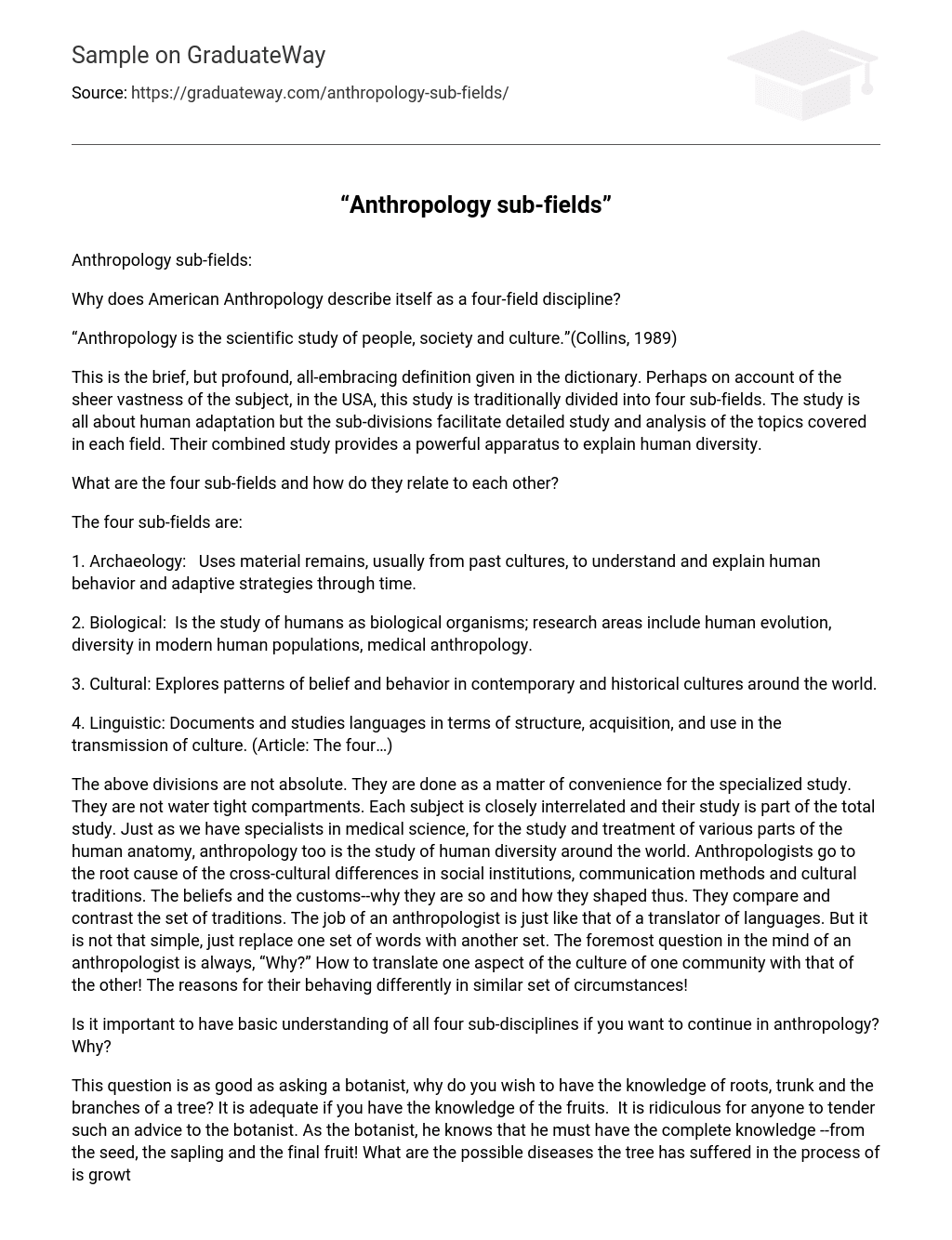Anthropology sub-fields:
Why does American Anthropology describe itself as a four-field discipline?
“Anthropology is the scientific study of people, society and culture.”(Collins, 1989)
This is the brief, but profound, all-embracing definition given in the dictionary. Perhaps on account of the sheer vastness of the subject, in the USA, this study is traditionally divided into four sub-fields. The study is all about human adaptation but the sub-divisions facilitate detailed study and analysis of the topics covered in each field. Their combined study provides a powerful apparatus to explain human diversity.
What are the four sub-fields and how do they relate to each other?
The four sub-fields are:
1. Archaeology: Uses material remains, usually from past cultures, to understand and explain human behavior and adaptive strategies through time.
2. Biological: Is the study of humans as biological organisms; research areas include human evolution, diversity in modern human populations, medical anthropology.
3. Cultural: Explores patterns of belief and behavior in contemporary and historical cultures around the world.
4. Linguistic: Documents and studies languages in terms of structure, acquisition, and use in the transmission of culture. (Article: The four…)
The above divisions are not absolute. They are done as a matter of convenience for the specialized study. They are not water tight compartments. Each subject is closely interrelated and their study is part of the total study. Just as we have specialists in medical science, for the study and treatment of various parts of the human anatomy, anthropology too is the study of human diversity around the world. Anthropologists go to the root cause of the cross-cultural differences in social institutions, communication methods and cultural traditions. The beliefs and the customs–why they are so and how they shaped thus. They compare and contrast the set of traditions. The job of an anthropologist is just like that of a translator of languages. But it is not that simple, just replace one set of words with another set. The foremost question in the mind of an anthropologist is always, “Why?” How to translate one aspect of the culture of one community with that of the other! The reasons for their behaving differently in similar set of circumstances!
Is it important to have basic understanding of all four sub-disciplines if you want to continue in anthropology? Why?
This question is as good as asking a botanist, why do you wish to have the knowledge of roots, trunk and the branches of a tree? It is adequate if you have the knowledge of the fruits. It is ridiculous for anyone to tender such an advice to the botanist. As the botanist, he knows that he must have the complete knowledge –from the seed, the sapling and the final fruit! What are the possible diseases the tree has suffered in the process of is growth and what are the treatment modules. Why the fruits are of a particular quality. He is inquisitive to know the reasons for that. Similarly an anthropologist needs to specialize and gather full knowledge of the subjects covered in all the four sub-fields to be an authority on anthropology.
Once the knowledge of various theories is perfectly grasped, and then comes the application of what is gained to practical applications. Such knowledge is useful in variety of majors, like business, medicine, law and education. Human diversity specialists have many a careers knocking at their doors. With the tremendous technological advancement, the world has shrunk!
However, the socio cultural subfield of anthropology is the most sought after branch in USA. A minority opinion also says that anthropology refers only to socio cultural anthropology. The function of a socio cultural anthropologist is to reach out to various communities, be with them, mingle with them to study and spend long periods of time, occasionally for years, observe them, talk to them and actually participate in their activities. Only by experiencing their activities, he can have the actual feel and convey his ideas to the world around. Statistical analysis done mostly by the government agencies may be important from the political point of view, but what is really important is the qualitative analysis. This approach is also called “ethnography.” That will help the anthropologist to understand why several dynamic changes are taking place at several levels simultaneously.
One should not be under the impression that anthropology is the study of the old. The modern materialistic civilization throws enough situations that are of interest to the anthropologist.
“While it is hard to come up with a clear personality profile for socio cultural anthropologists, quite a number of them do have something in common: they had significant exposure to more than one culture as children. Perhaps they were raised in bicultural/bilingual families. Perhaps their parents had jobs that required their family to move from country to country, for instance in the diplomatic service. Perhaps their families migrated from one country to another.”(Article: What is …)
The aspects that fascinate an anthropologist are many. It could be the DNA molecule of skeleton, supernatural beliefs, how the primitive evolution shaped and reached the present levels. It is the study of the past, the present and some of the findings of anthropologist, can set future goals in many fields. Its study provides insights into fields like economics, psychology, biology, geography, history, political science, medicine and many other disciplines.
References:
Article: The Four Field Approach.
uwadmnweb.uwyo.edu/anthropology/undergraduate/fourfield.html – 3k –Retrieved on May 8, 2007.
Article: What is anthropology? University of North-Texas, updated on February 2, 2006.
www.unt.edu/anthropology/whatis.htm – 13k -Retrieved on May 8, 2007
Collins Cobuild English Language Dictionary, Collins ELT. London, 1989.





